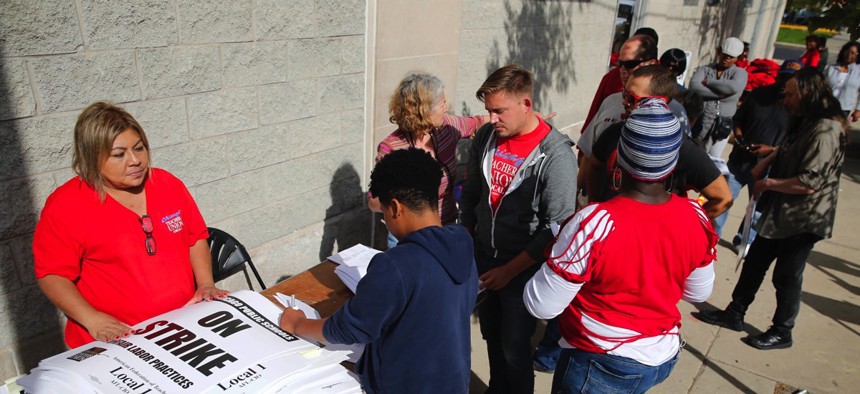Chicago Teachers Strike Averted; Kentucky Confronts Lexington’s Panhandling Ban

Chicago Teachers Union members pick up strike material outside the union's strike headquarters. Charles Rex Arbogast / AP Photo

Connecting state and local government leaders
Also in our State and Local Daily Digest: Oso landslide legal settlements in Washington state; Oklahoma failed to obligate disaster recovery funds; and an Oregon county challenges state over dam.
CHICAGO, ILLINOIS
LABOR | The Chicago Teachers Union reached a tentative agreement with the city’s school board minutes before a midnight deadline Monday, narrowly averting a strike. A key sticking point during negotiations was the so-called pension pickup. This refers to the practice of the district paying the bulk of teacher pension contributions. Under the proposed contract, the pickup will remain in place for CTU members hired before Dec. 31, 2016. According to union president Karen Lewis, the proposed contract also includes commitments about kindergarten through second grade class sizes and teacher layoffs. The union had demanded more money for schools. And three sources told the Chicago Tribune that Mayor Rahm Emanuel had agreed to channel surplus funds from tax increment financing districts toward the public school district, which is the nation’s third-largest. [Chicago Tribune]
FRANKFORT, KENTUCKY
PANHANDLING | Kentucky’s state Supreme Court will hear arguments Friday on whether panhandlers have a legally protected right to ask pedestrians and motorists for money and whether a citywide panhandling ban in Lexington amounts to a violation of First Amendment free speech rights. Federal courts have found similar bans unconstitutional. Many of those court rulings followed a 2015 U.S. Supreme Court decision that pertained to First Amendment law. “We have seen other challenges to ordinances that criminalize homelessness, but it’s the ban on panhandling that we have seen the most legal challenges because of the (2015 U.S. Supreme Court case),” said Tristia Bauman, a senior attorney for the National Law Center on Homelessness and Poverty. [Lexington Herald Leader]
SEATTLE, WASHINGTON
LEGAL SETTLEMENTS | The state of Washington and a timber company have come to agreements to settle with the survivors and the family members of those who died in the March 2014 that killed 43 people in and around the small town of Oso. A trial in the case, brought by 40 plaintiffs in a class action, had been slated to begin Monday in King County Superior Court in Seattle. The plaintiffs accused the state and the tiber company of wrongdoing, which both parties had denied. In the settlements, the state agreed to pay $50 and Grandy Lake Forest Associates LLC agreed to pay $10 million. [The Wall Street Journal]
OKLAHOMA CITY, OKLAHOMA
DISASTER FUNDS | A federal audit performed by the Office of Inspector General found Oklahoma failed to obligate and spend $16 million in Community Development Block Grant Disaster Recovery funds appropriately for events in 2011, 2012 and 2013. The funds were administered by the Oklahoma Commerce Department as they would’ve been for normal CDBG allocations and with the U.S. Department of Housing and Urban Development’s approval, according to the governor’s office. “The State failed to support how it determined activity eligibility, existence, disaster event qualification, reasonableness of cost estimates, prioritization, and fund allocation as required,” according to the audit. “It routinely did not determine compliance with procurement and environmental requirements.” For example, Oklahoma obligated $268,000 to resurface a Lincoln County road without verifying tornado damage. The report is advisory and does not accuse the Commerce Department of criminal activity, but HUD staff may demand the funds be repaid, which would come out of future federal grants. [The Oklahoman]
GOLD BEACH, OREGON
WATERWAYS | When Curry County’s Parks and Recreation Department repaired a wooden weir on Floras Lake to restore water levels, it lacked the proper permit to do the work, according to the Oregon Department of State Lands. Thus, the county may have violated the state’s “removal and fill” laws, though the former is arguing in court repairs wouldn’t harm the wetlands—a salmon habitat and State Scenic Waterway—more than when the river barrier was first built. DSL wants Curry County to remove a 10-foot section of the dam to allow fish passage by month’s end or else incur a $6,000 fine. [The World]

NEXT STORY: Employment Rates Nudge Closer to Pre-Recession Levels




